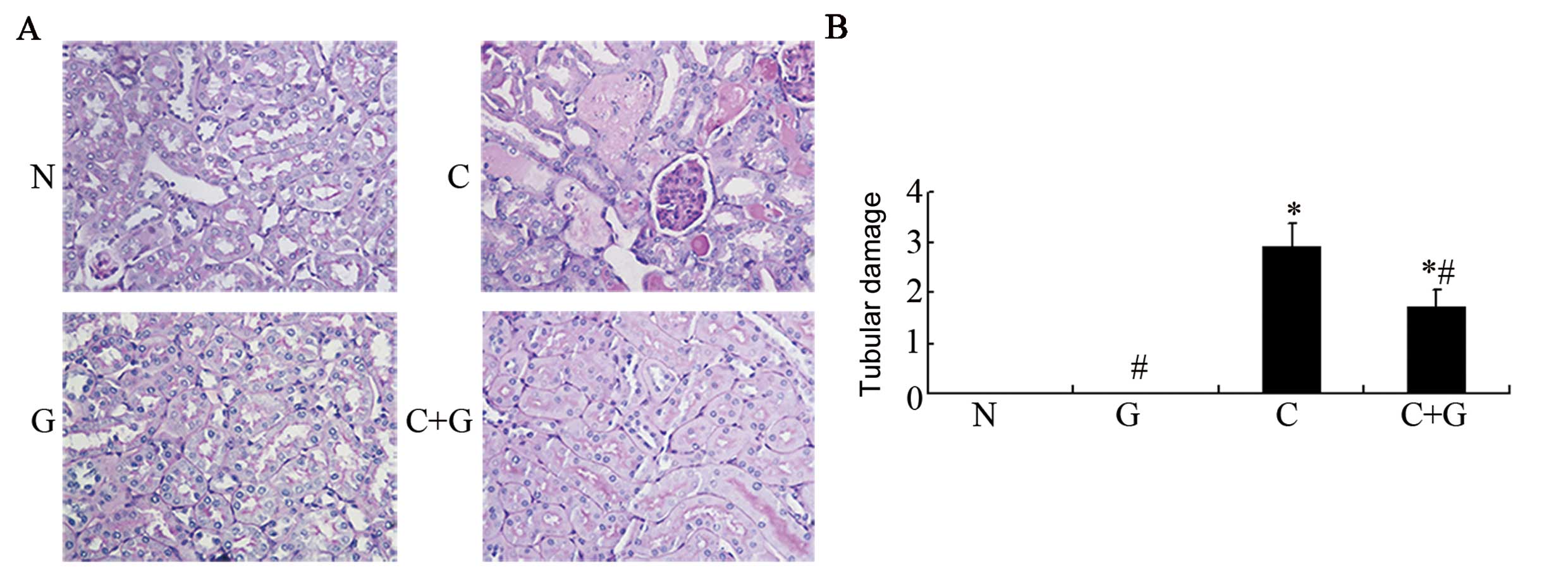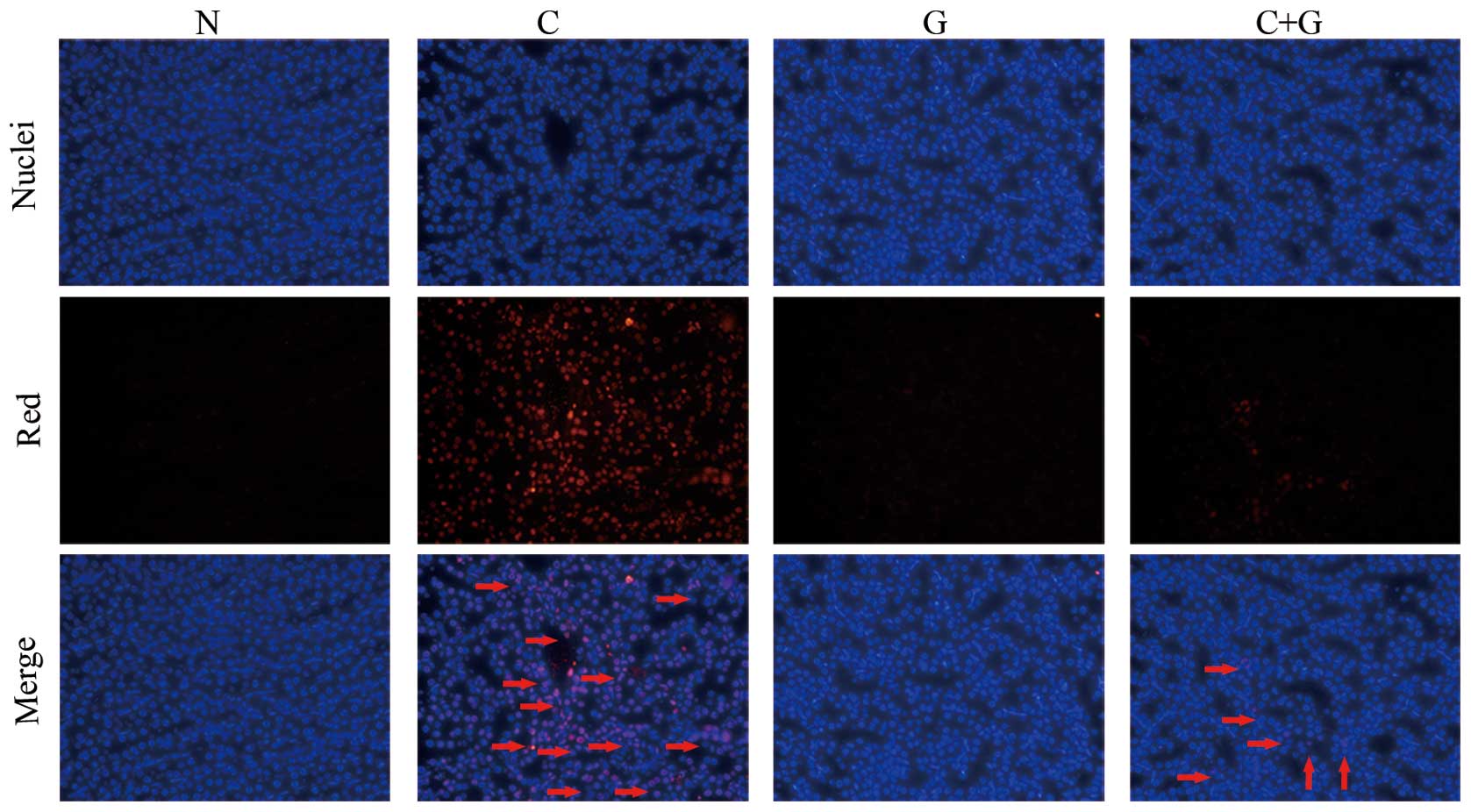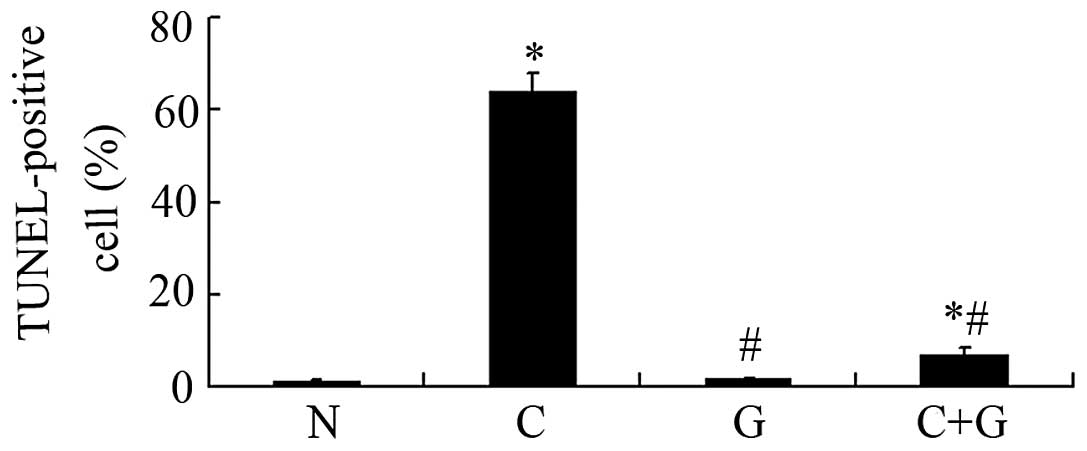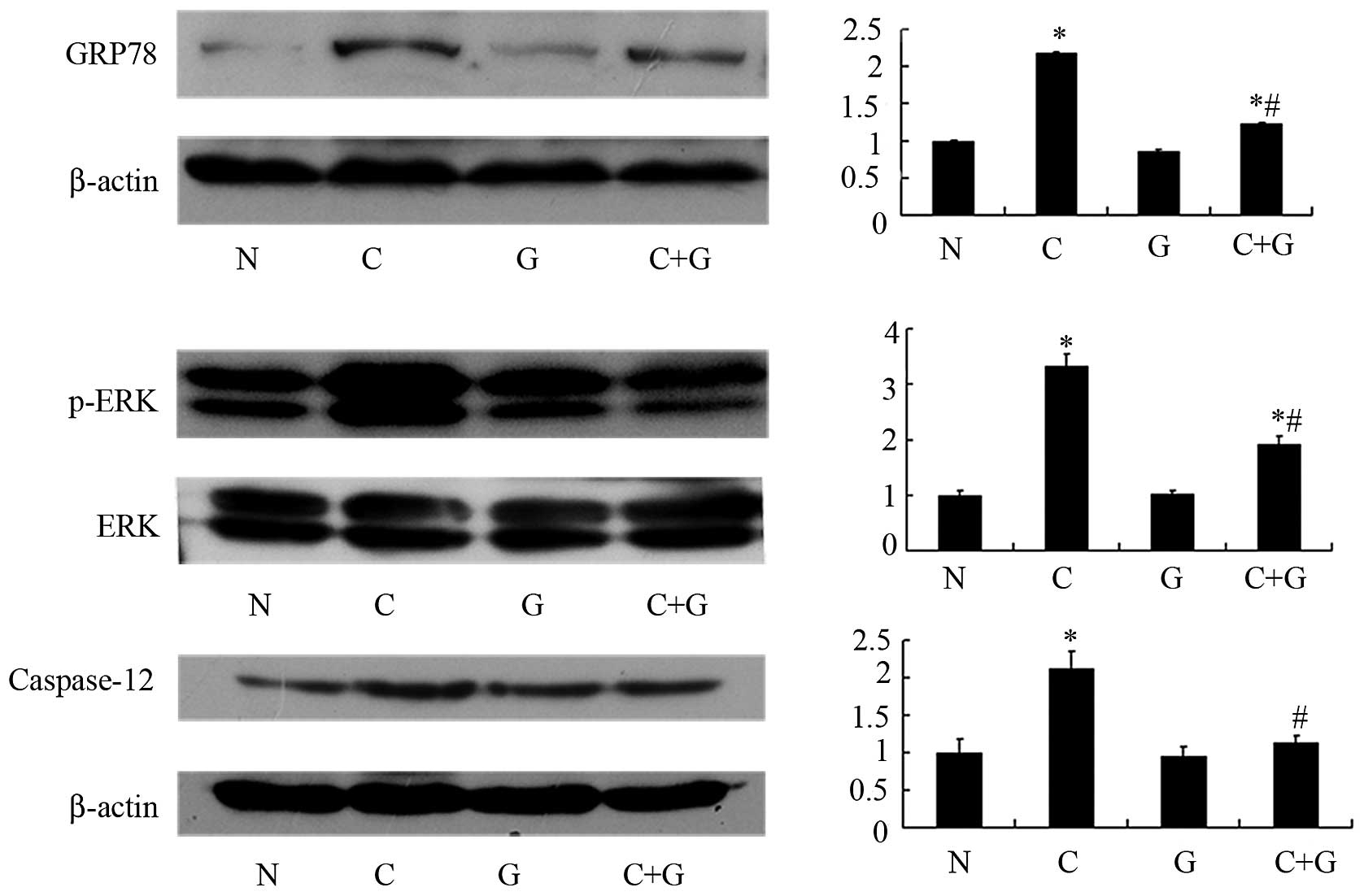|
1
|
Miller RP, Tadagavadi RK, Ramesh G and
Reeves WB: Mechanisms of cisplatin nephrotoxicity. Toxins.
2:2490–2518. 2010. View Article : Google Scholar
|
|
2
|
Arany I and Safirstein RL: Cisplatin
nephrotoxicity. Semin Nephrol. 23:460–464. 2003. View Article : Google Scholar : PubMed/NCBI
|
|
3
|
Yao X, Panichpisal K, Kurtzman N and
Nugent K: Cisplatin nephrotoxicity: a review. Am J Med Sci.
334:115–124. 2007. View Article : Google Scholar
|
|
4
|
Cohen SM and Lippard SJ: Cisplatin: from
DNA damage to cancer chemotherapy. Prog Nucleic Acid Res Mol Biol.
67:93–130. 2001. View Article : Google Scholar : PubMed/NCBI
|
|
5
|
Hanigan MH and Devarajan P: Cisplatin
nephrotoxicity: molecular mechanisms. Cancer Ther. 1:47–61.
2003.PubMed/NCBI
|
|
6
|
Brady HR, Kone BC, Stromski ME, Zeidel ML,
Giebisch G and Gullans SR: Mitochondrial injury: an early event in
cisplatin toxicity to renal proximal tubules. Am J Physiol.
258:1181–1187. 1990.PubMed/NCBI
|
|
7
|
Pabla N and Dong Z: Cisplatin
nephrotoxicity: mechanisms and renoprotective strategies. Kidney
Int. 73:994–1007. 2008. View Article : Google Scholar : PubMed/NCBI
|
|
8
|
Liu GH, Sun YY, Li ZH, et al: Apoptosis
induced by endoplasmic reticulum stress involved in diabetic kidney
disease. Biochem Biophys Res Commun. 370:651–656. 2008. View Article : Google Scholar : PubMed/NCBI
|
|
9
|
Schroder M and Kaufman RJ: The mammalian
unfolded protein response. Annu Rev Biochem. 74:739–789. 2005.
View Article : Google Scholar
|
|
10
|
Szegezdi E, Logue SE, Gorman AM and Samali
A: Mediators of endoplasmic reticulum stress-induced apoptosis.
EMBO Rep. 7:880–885. 2006. View Article : Google Scholar : PubMed/NCBI
|
|
11
|
Cheng M, Gao HQ, Xu L, Li BY, Zhang H and
Li XH: Cardioprotective effects of grape seed proanthocyanidins
extracts in streptozocin induced diabetic rats. J Cardiovasc
Pharmacol. 50:503–509. 2007.PubMed/NCBI
|
|
12
|
Li BY, Cheng M, Gao HQ, et al:
Back-regulation of six oxidative stress proteins with grape seed
proanthocyanidin extracts in rat diabetic nephropathy. J Cell
Biochem. 104:668–679. 2008. View Article : Google Scholar : PubMed/NCBI
|
|
13
|
Li X, Xiao Y, Gao H, et al: Grape seed
proanthocyanidins ameliorate diabetic nephropathy via modulation of
levels of AGE, RAGE and CTGF. Nephron Exp Nephrol. 111:31–41. 2009.
View Article : Google Scholar : PubMed/NCBI
|
|
14
|
Leibbrandt ME, Wolfgang GH, Metz AL,
Ozobia AA and Haskins JR: Critical subcellular targets of cisplatin
and related platinum analogs in rat renal proximal tubule cells.
Kidney Int. 48:761–770. 1995. View Article : Google Scholar
|
|
15
|
Kharbanda S, Ren R, Pandey P, et al:
Activation of the c-Abl tyrosine kinase in the stress response to
DNA-damaging agents. Nature. 376:785–788. 1995. View Article : Google Scholar : PubMed/NCBI
|
|
16
|
Lakshmanan AP, Thandavarayan RA,
Palaniyandi SS, et al: Modulation of AT-1R/CHOP-JNK-Caspase12
pathway by olmesartan treatment attenuates ER stress-induced renal
apoptosis in streptozotocin-induced diabetic mice. Eur J Pharm Sci.
44:627–634. 2011.PubMed/NCBI
|
|
17
|
Wei Q, Dong G, Franklin J and Dong Z: The
pathological role of Bax in cisplatin nephrotoxicity. Kidney Int.
72:53–62. 2007. View Article : Google Scholar : PubMed/NCBI
|
|
18
|
Kong DY, Li Z, Gao CL, et al:
Erythropoietin protects against cisplatin-induced nephrotoxicity by
attenuating endoplasmic reticulum stress-induced apoptosis. J
Nephrol. 26:219–227. 2013. View Article : Google Scholar
|
|
19
|
Cetin A, Arslanbas U, Saraymen B, Canoz O,
Ozturk A and Sagdic O: Effects of grape seed extract and origanum
onites essential oil on cisplatin-induced hepatotoxicity in rats.
UHOD. 21:133–140. 2011. View Article : Google Scholar
|
|
20
|
Sayed AA: Proanthocyanidin protects
against cisplatin-induced nephrotoxicity. Phytother Res.
23:1738–1741. 2009. View
Article : Google Scholar
|
|
21
|
Chacon MR, Arola L and Guitierrez C:
Grape-seed procyanidins modulate inflammation on human
differentiated adipocytes in vitro. Cytokine. 47:137–142.
2009. View Article : Google Scholar : PubMed/NCBI
|
|
22
|
Cho ML, Heo YJ, Park MK, et al: Grape seed
proanthocyanidin extract (GSPE) attenuates collagen induced
arthritis. Immunol Lett. 124:102–110. 2009. View Article : Google Scholar : PubMed/NCBI
|
|
23
|
Johnson VL, Brodsky N and Bhandari V:
Effect of antioxidants on apoptosis and cytokine release in fetal
rat Type II pneumocytes exposed to hyperoxia and nitric oxide.
Cytokine. 28:10–16. 2004. View Article : Google Scholar : PubMed/NCBI
|
|
24
|
Ma L, Gao HQ, Li BY, Ma YB, You BA and
Zhang FL: Grape seed proanthocyanidin extracts inhibit vascular
cell adhesion molecule expression induced by advanced glycation end
products through activation of peroxisome proliferators-activated
receptor gamma. J Cardiovasc Pharmacol. 49:293–298. 2007.
View Article : Google Scholar
|
|
25
|
Terra X, Montagut G, Bustos M, et al:
Grape-seed procyanidins prevent low-grade inflammation by
modulating cytokine expression in rats fed a high-fat diet. J Nutr
Biochem. 20:210–218. 2009. View Article : Google Scholar : PubMed/NCBI
|
|
26
|
Sen CK and Bagchi D: Regulation of
inducible adhesion molecule expression in human endothelial cells
by grape seed proanthocyanidin extract. Mol Cell Biochem. 216:1–7.
2001. View Article : Google Scholar : PubMed/NCBI
|
|
27
|
Kim H, Kim JY, Song HS, Park KU, Mun KC
and Ha E: Grape seed proanthocyanidin extract inhibits
interleukin-17-induced interleukin-6 production via MAPK pathway in
human pulmonary epithelial cells. Naunyn Schmiedebergs Arch
Pharmacol. 383:555–562. 2011. View Article : Google Scholar : PubMed/NCBI
|
|
28
|
Yang HB, Xu ZF, Liu W, et al: Effect of
grape seed proanthocyanidin extracts on methylmercury-induced
neurotoxicity in rats. Biol Trace Elem Res. 147:156–164. 2012.
View Article : Google Scholar : PubMed/NCBI
|
|
29
|
Cedó L, Auvi AC, Pallares V, et al: Grape
seed procyanidin extract modulates proliferation and apoptosis of
pancreatic beta-cells. Food Chemistry. 138:524–530. 2013.PubMed/NCBI
|
|
30
|
van der Kallen CJ, van Greevenbroek MM,
Stehouwer CD and Schalkwijk CG: Endoplasmic reticulum
stress-induced apoptosis in the development of diabetes: is there a
role for adipose tissue and liver? Apoptosis. 14:1424–1434.
2009.PubMed/NCBI
|
|
31
|
Clark JS, Faisal A, Baliga R, Nagamine Y
and Arany I: Cisplatin induces apoptosis through the ERK-p66shc
pathway in renal proximal tubule cells. Cancer Lett. 297:165–170.
2010. View Article : Google Scholar : PubMed/NCBI
|
|
32
|
Szegezdi E, Fitzgerald U and Samali A:
Caspase-12 and ER-stress-mediated apoptosis: the story so far. Ann
NY Acad Sci. 1010:186–194. 2003. View Article : Google Scholar : PubMed/NCBI
|
|
33
|
Nakagawa T, Zhu H, Morishima N, et al:
Caspase-12 mediates endoplasmic-reticulum-specific apoptosis and
cytotoxicity by amyloid-β. Nature. 403:98–103. 2000.PubMed/NCBI
|



















